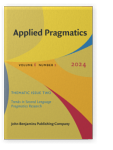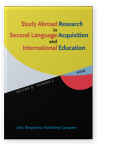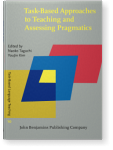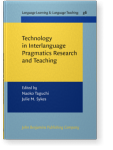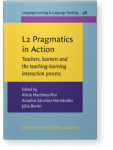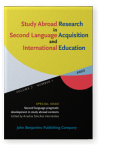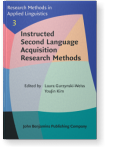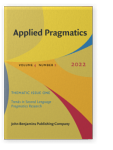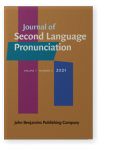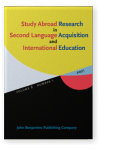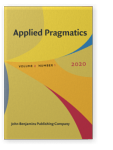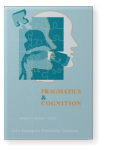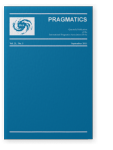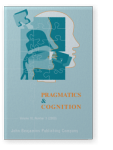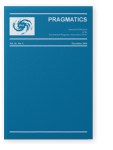Naoko Taguchi
List of John Benjamins publications for which Naoko Taguchi plays a role.
Journals
ISSN 2405-5522 | E-ISSN 2405-5530
Titles
Task-Based Approaches to Teaching and Assessing Pragmatics
Edited by Naoko Taguchi and YouJin Kim
[Task-Based Language Teaching, 10] 2018. x, 312 pp.
Subjects Language acquisition | Language teaching | Pragmatics
Technology in Interlanguage Pragmatics Research and Teaching
Edited by Naoko Taguchi and Julie M. Sykes
[Language Learning & Language Teaching, 36] 2013. viii, 276 pp.
Subjects Applied linguistics | Language acquisition | Pragmatics
2024 Dear readers Trends in Second Language Pragmatics Research Part 2, pp. 115–116 | Editorial
2023 Chapter 11. Usage-based approach to teaching L2 pragmatics L2 Pragmatics in Action: Teachers, learners and the teaching-learning interaction process, Martínez-Flor, Alicia, Ariadna Sánchez-Hernández and Júlia Barón (eds.), pp. 267–292 | Chapter
Adopting usage-based approaches, this study analysed second language L2 Chinese learners’ development of Chinese sentence final particles (SFPs) in two computer-mediated communication (CMC) conditions: CMC with and without instruction. The experimental condition provided opportunities to interact… read more
2022 Effects of linguistic proficiency on speech act development in L2 Chinese during study abroad Second language pragmatic development in study abroad contexts, Sánchez-Hernández, Ariadna (ed.), pp. 116–151 | Article
This study investigated the effects of different levels of linguistic proficiency on the development of multiple speech acts during study abroad. Participants were 109 American learners of Chinese recruited from a study abroad program in China. They were divided into a higher proficiency (HP)… read more
2022 Commentary Second language pragmatic development in study abroad contexts, Sánchez-Hernández, Ariadna (ed.), pp. 176–180 | Commentary
Ariadna Sánchez-Hernández presents five articles that showcase current trends of study abroad research in second language (L2) pragmatics. The study abroad context has attracted a large number of empirical investigations in L2 pragmatics (for a review, see Pérez Vidal & Shively, 2019). The… read more
2022 Chapter 7. Pragmatics: Assessing learning outcomes in instructional studies Instructed Second Language Acquisition Research Methods, Gurzynski-Weiss, Laura and YouJin Kim (eds.), pp. 149–180 | Chapter
The field of instructed SLA (ISLA) has grown rapidly in recent years to examine how systematic manipulations of instructional conditions can lead to the development of second language (L2) knowledge and use (Loewen & Sato, 2017). Following this trend, L2 pragmatics researchers have implemented… read more
2022 Editorial Trends in Second Language Pragmatics Research Part I: , pp. 119–120 | Editorial
2021 The interplay of proficiency and study abroad experience on the prosody of L2 speech acts Journal of Second Language Pronunciation 7:3, pp. 343–369 | Article
Adopting Brazil’s (1997) prosodic framework, this study examined whether proficiency and study abroad experience impact second language (L2) English learners’ spoken production of speech acts. Twenty-four native English speakers and 64 Japanese learners of L2 English participated in the study.… read more
2021 Social contact and speech act strategies in a Chinese study abroad context Study Abroad Research in Second Language Acquisition and International Education 6:1, pp. 3–31 | Article
This study examined the relationship between reported amounts of social contact and speech act strategies among 70 learners of Chinese enrolled in a study abroad program in Beijing. The participants completed a computer-delivered spoken discourse completion task (spoken DCT) eliciting three… read more
2020 Proficiency effects on L2 Arabic refusals: Appropriateness, linguistic strategies and multidialectal practices Applied Pragmatics 2:1, pp. 26–53 | Article
This study examined the relationship between L2 proficiency and (1) appropriateness of refusals, (2) use of refusal strategies, and (3) multidialectal practices in performing refusals in Arabic. Using a spoken discourse completion task (spoken DCT), data were collected from 45 learners of Arabic… read more
2018 Chapter 4. Task complexity effects on interaction during a collaborative persuasive writing task: A conversation analytic perspective Task-Based Approaches to Teaching and Assessing Pragmatics, Taguchi, Naoko and YouJin Kim (eds.), pp. 83–109 | Chapter
This study examined whether task complexity (Robinson, 2011a, b), induced through reasoning demands, affects L2 learners’ interaction patterns during a collaborative writing task that involved the pragmatic act of persuasion. We analyzed interaction of two pairs of students when they co-constructed… read more
2018 Chapter 1. Data collection and analysis in developmental L2 pragmatics research: Discourse completion test, role play, and naturalistic recording Critical Reflections on Data in Second Language Acquisition, Gudmestad, Aarnes and Amanda Edmonds (eds.), pp. 7–32 | Chapter
This chapter compares common data collection and analysis methods used in longitudinal studies in second language pragmatics. Specifically, three data collection methods used to document speech act development are compared: discourse completion tasks (written and spoken), role plays, and… read more
2018 Chapter 1. Task-based approaches to teaching and assessing pragmatics: An overview Task-Based Approaches to Teaching and Assessing Pragmatics, Taguchi, Naoko and YouJin Kim (eds.), pp. 1–24 | Chapter
2013 Prologue. The future of pragmatics and technology: Where are we headed? Technology in Interlanguage Pragmatics Research and Teaching, Taguchi, Naoko and Julie M. Sykes (eds.), pp. 271–274 | Article
2013 Chapter 2. Comprehension of conversational implicature: What response times tell us Technology in Interlanguage Pragmatics Research and Teaching, Taguchi, Naoko and Julie M. Sykes (eds.), pp. 19–41 | Article
Computer technology has created new options for interlanguage pragmatics analysis. Researchers can now quickly test second language (L2) learner’s efficiency in processing pragmatic meaning without relying on paper-and-pencil methods. This chapter presents examples of such technology-enhanced… read more
2013 Chapter 1. Introduction: Technology in interlanguage pragmatics research and teaching Technology in Interlanguage Pragmatics Research and Teaching, Taguchi, Naoko and Julie M. Sykes (eds.), pp. 1–15 | Article
2013 Comprehension of conversational implicature in L2 Chinese Pragmatics & Cognition 21:1, pp. 139–157 | Article
This study examined the ability to comprehend conventional and non-conventional implicatures, and the effect of proficiency and learning context (foreign language learners vs. heritage learners) on comprehension of implicature in L2 Chinese. Participants were three groups of college students of… read more
2011 Rater variation in the assessment of speech acts Pragmatics 21:3, pp. 453–471 | Article
This study addresses variability among native speaker raters who evaluated pragmatic performance of learners of English as a foreign language. Using a five-point rating scale, four native English speakers of mixed cultural background (one African American, one Asian American, and two Australians)… read more
2008 The effect of working memory, semantic access, and listening abilities on the comprehension of conversational implicatures in L2 English Pragmatics & Cognition 16:3, pp. 517–539 | Article
This research examined the extent to which pragmatic comprehension, namely accurate and speedy comprehension of conversational implicatures, is related to cognitive processing skills and general listening abilities. Thirty-five Japanese students learning English as a second language completed five… read more
2006 Analysis of appropriateness in a speech act of request in L2 English Pragmatics 16:4, pp. 513–533 | Article
Fifty-nine Japanese college students of English at two different proficiency levels were evaluated for their ability to produce a speech act of request in a spoken role play task. Learners’ production was analyzed quantitatively by rating performance on a six-point scale for overall… read more
